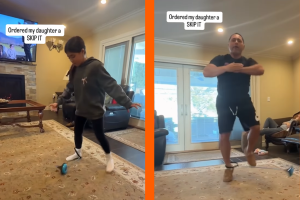Hey, people smoke. And quitting is hard.
I am not about to shame anyone who lights up. As most smokers know all too well, it’s a ridiculously hard habit to kick — and even just cutting back a bit can be a major headache (literally).
That’s why expansive new measures in California to stop would-be young smokers from ever lighting up in the first place is an incredibly welcome change.
Photo by Leon Neal/AFP/Getty Images.
In large part to keep its young people healthier, California has passed sweeping new regulations on tobacco.
The state’s decision to up the legal smoking age is probably the most game-changing of the new measures, which were signed into law by Gov. Jerry Brown on May 4, 2016.
With an exception for active duty military members, people in the state of California must now be at least 21 years old to buy tobacco products.
Photo by Justin Sullivan/Getty Images.
“What this means for California is now we can know that our youth are less likely to be addicted to this horrible drug of tobacco,” State Sen. Ed Hernandez said of the new age requirements. “There’s going to be less addiction to tobacco, [and] we’re going to reduce health care costs and save lives.”
Another big change these regulations have introduced is in regards to e-cigarettes — which are now banned in all the same spots as traditional cigarettes, including schools, restaurants, and hospitals, NPR reported.
Why the stricter regulations on e-cigs? According to Stanton Glant, director of the Center for Tobacco Control Research and Education at University of California, San Francisco, e-cigarettes still pose a threat to public health — even if they’re not as harmful as their traditional cigarette counterparts.
Photo by Justin Sullivan/Getty Images.
“Exposing the developing brain to nicotine, which is in both e-cigarettes and conventional cigarettes, physically changes the brain,” he said. “That’s why the younger someone starts to smoke, the more addicted they tend to get … and the harder time they have stopping.”
The safety of e-cigarettes has caught the attention of the federal government too. Just today, the FDA announced a ban on sales to those under 18 years old, citing the health of young Americans as reason for the change.
Although the new measures in California are being applauded by major health organizations, not everyone’s on board. The Smoke-Free Alternatives Trade Association, for instance, claimed the big move on e-cigarettes is “a step backward” for California, seeing as some vapor products are tobacco-free and, thus, shouldn’t be a health concern.
The new measures in California coincide with a growing consensus across the U.S.: Cigarettes are, slowly but surely, on their way out.
In the 1960s, more than 40% of American adults were cigarette smokers, according to the CDC. That figure has fallen substantially throughout the last several decades, standing at about 17% in 2014. (Heck, more college students smoked marijuana than cigarettes for the first time ever last year.)
Photo by Chris Roussakis/AFP/Getty Images.
As research has continued to point to cigarettes as a major cause of death in the U.S., state and local laws have cracked down on their use.
Although Hawaii beat California to increasing its legal smoking age (the Aloha State did so this past January), more than 100 cities — including New York, Boston, and San Francisco — have passed laws requiring tobacco users be at least 21 years old.
So, yes, people smoke. And, yes, quitting is hard. But smoking kills. And the more young people these laws prevent from getting hooked, the better.
This week marked a major victory in keeping young people healthier, Hernandez said. Hopefully, the rest of the country will follow California and Hawaii’s leads.
“Today was an enormous victory for not only this generation, but also for many generations to come who will not suffer the deadly impacts of tobacco.”





























